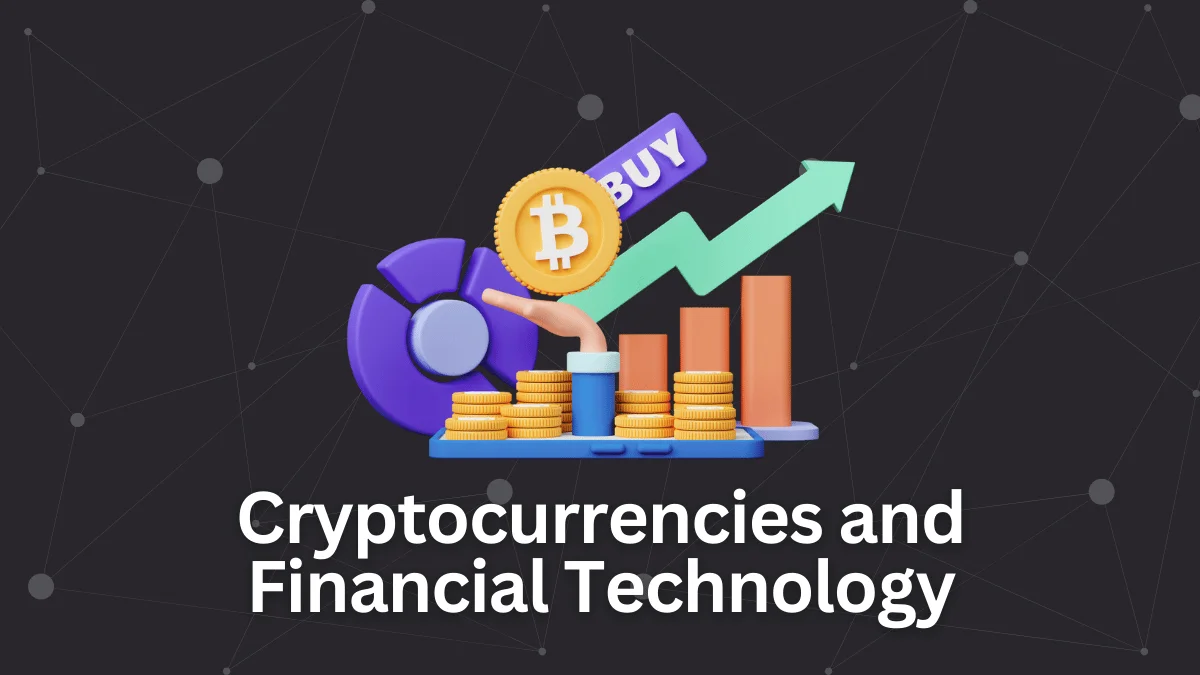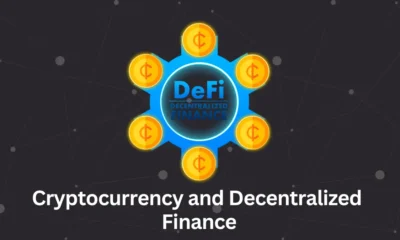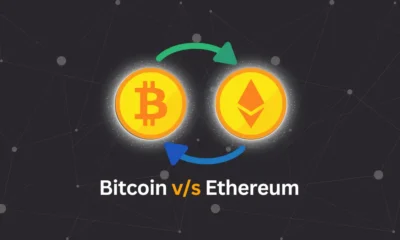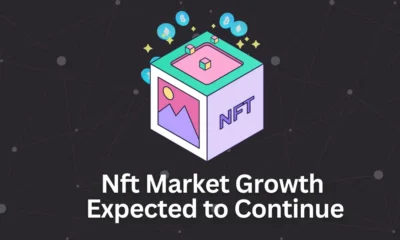Crypto Guides
CRYPTOCURRENCIES AND FINANCIAL TECHNOLOGY
The financial environment as we know it is being redefined by a quickly growing coin that includes cryptocurrencies and financial technology, or FinTech.

The financial environment as we know it is being redefined by a quickly growing coin that includes cryptocurrencies and financial technology, or FinTech. The combination of these two innovative forces will present new challenges and possibilities for businesses, regulators, and consumers alike. Let’s take a hither look at this fascinating community, the goods on the global frugality, and how cryptocurrencies are shaping the future of fintech. Cryptocurrency prices have risen at a very rapid pace. The usage of digital currencies has skyrocketed since the 2009 release of Bitcoin, with many of them promising to completely change how we see and handle money.
FINANCIAL TECHNOLOGY
Since cryptocurrencies employ blockchain technology to facilitate secure, decentralized, and usually anonymous transactions, they are appealing for applications beyond simple payment. Contrarily, FinTech refers to a wider range of technology innovation in the financial services industry. Peer-to-peer lending platforms, crowdfunding, mobile banking, and more are all included. FinTech uses technology to normalize access to fiscal services by streamlining conventional dollars-and-cents procedures and lowering the cost, complexity, and availability of fiscal services. FinTech and cryptocurrencies together have revolutionary capabilities that might change banking, investing, and capitalism itself. The FinTech industry has already started to be impacted by cryptocurrencies in some significant ways.
Payments & Transfers Cryptocurrencies
Compared to traditional banking and payment methods, which may be expensive, sluggish, and subject to national borders, cryptocurrencies provide a strong substitute. With digital currencies, transactions can be faster, cheaper, and global, a feature that FinTech companies are quickly incorporating to offer more efficient services.
Smart Contracts: These are self-executing contracts with the terms of the agreement directly written into code. Brilliant agreements, empowered by blockchain innovation, can computerize and get many monetary cycles, from protection cases to property deals, lessening the requirement for mediators and smoothing out tasks for FinTech organizations.
Decentralized Finance (DeFi): This is perhaps where cryptocurrencies have the most profound impact on FinTech. This would reduce the need for intermediaries and streamline operations for FinTech companies.
Decentralized Finance (DeFi): This is possibly the area in which cryptocurrencies have the biggest influence on FinTech. DeFi generates financial services, such as decentralized lending, borrowing, and interest revenue, that are not offered by conventional banking institutions by utilizing cryptocurrencies and blockchain technology. It signifies a substantial change in the direction of a financial system that is inclusive and transparent.
Security and Privacy: Cryptocurrencies offer enhanced security features and privacy through blockchain technology, which is appealing in an era where digital security is paramount. FinTech businesses are using these features to guard against fraud and cyberattacks on their services and the data of their clients.
However, the marriage of cryptocurrencies and FinTech is not without its challenges. Both businesses face serious issues from unstable requests, erratic laws, and specialized challenges like interoperability and scalability.
In addition, the anonymity provided by cryptocurrencies gives rise to worries about their illicit use, which is a challenge for regulators trying to strike a balance between innovation, consumer protection, and financial stability.
Cryptocurrencies have a chance to fundamentally alter the financial industry, not withstanding these difficulties. By providing the foundation for more secure, efficient, and accessible financial products and services, they assist in FinTech’s mission to innovate and improve the global financial ecosystem. Further advancements in the FinTech and cryptocurrency sectors ought to provide even more innovative goods and services. From tokenized assets and initial coin offerings (ICOs) to novel forms of digital identity, the possibilities are virtually endless. The future of finance will be significantly shaped by the combination of FinTech and cryptocurrencies as technology develops and legal structures change.
In summary, the convergence of FinTech and cryptocurrencies marks a turning point in the development of financial services. The opportunity for innovation is enormous as we negotiate this unexplored area; it can completely change the way we invest, spend, and save. Even if there are still obstacles to overcome, these two sectors must keep working together to build a more accessible, effective, and secure financial future for everybody. Joining this financial revolution at this exciting moment is quite rewarding since the adventure of cryptocurrencies and FinTech is only getting started.
Crypto Guides
Top 10 Crypto Exchanges for 2024: Best Platforms for Digital Currency

In the world of cryptocurrency, choosing the right exchange can make all the difference in your trading experience. With such a lot of alternatives to be had, finding a steady platform, person-friendly, and gives aggressive expenses is important. Whether you are a seasoned trader or just starting, this guide will help you navigate through the top 10 crypto exchanges of 2024.
CRYPTO EXCHANGE CURRENCIES
1. Binance
Overview
Binance is one of the largest and most popular crypto exchanges globally. Known for its giant range of cryptocurrencies and superior trading features, Binance caters to both novices and experienced traders.
Key Features:
– Variety of Cryptocurrencies: Offers over 500 cryptocurrencies.
– Low Fees: Competitive trading fees, especially for high-volume traders.
– Advanced Tools: Provides a suite of trading tools and options.
Why It Stands Out:
Binance’s large selection of cryptocurrencies and advanced trading options make it a favorite among serious traders. Its low costs and sturdy security features are a testament to its enchantment.
2. Coinbase
Overview:
Coinbase is one of the most user-friendly exchanges available. It is ideal for beginners looking to buy and sell cryptocurrencies with ease.
Key Features:
– Ease of Use: Simple interface and easy account setup.
– Security: Strong security features and insurance protection.
– Educational Resources: Provides a range of educational materials for new users.
Why It Stands Out:
Coinbase’s user-friendly design and strong security measures make it an excellent choice for newcomers to the crypto exchange world.
3. Kraken
Overview:
Kraken is known for its strong security features and wide range of supported cryptocurrencies. It offers advanced buying and selling tools for more skilled customers.
Key Features:
– Security: High levels of security with a solid track record.
– Diverse Options: Supports a wide range of cryptocurrencies and fiat currencies.
– Advanced Trading: Features like margin trading and futures.
Why It Stands Out:
Kraken’s robust security and comprehensive trading options make it a solid choice for both beginners and advanced traders.
4. Bitfinex
Overview:
Bitfinex is a popular choice for traders looking for advanced features and high liquidity. It gives a wide variety of cryptocurrencies and trading pairs.
Key Features:
– High Liquidity: Offers high liquidity and advanced trading options.
– Varied Cryptocurrencies: Supports a large number of cryptocurrencies.
– Advanced Features: Includes margin trading and lending.
Why It Stands Out:
Bitfinex’s advanced trading features and high liquidity make it ideal for experienced traders looking for more sophisticated tools.
5. Huobi
Overview:
Huobi is a global crypto exchange with a strong presence in Asia. It presents a complete trading platform with a wide variety of cryptocurrencies.
Key Features:
– Global Reach: Operates in multiple countries with strong security measures.
– Diverse Coins: Supports a broad range of cryptocurrencies.
– Advanced Trading Tools: Offers various trading options and tools.
Why It Stands Out:
Huobi’s global presence and extensive range of cryptocurrencies make it a versatile platform for traders around the world.
6. KuCoin
Overview:
KuCoin is known for its user-friendly interface and extensive selection of cryptocurrencies. It also offers features such as staking and futures trading.
Key Features:
– User-Friendly: Easy to navigate with a simple interface.
– Wide Range: Supports many cryptocurrencies and trading pairs.
– Additional Features: Staking and futures trading available.
Why It Stands Out:
KuCoin’s ease of use and additional features like staking make it a popular choice for both beginners and experienced traders.
7. OKEx
Overview:
OKEx is a comprehensive trading platform offering a variety of digital assets and trading options. It is known for its advanced trading tools and high liquidity.
Key Features:
– Advanced Tools: Provides a range of advanced trading tools and options.
– High Liquidity: Ensures efficient trading with high liquidity.
– Wide Range: Supports numerous cryptocurrencies and trading pairs.
Why It Stands Out:
OKEx’s advanced tools and high liquidity make it a strong choice for traders seeking a robust trading experience.
8. Gemini
Overview:
Gemini is a regulated exchange based in the U.S., known for its emphasis on security and compliance. It offers a secure platform for trading various cryptocurrencies.
Key Features:
– Regulated: Compliant with U.S. regulations and security standards.
– Security: Strong security features and insurance protection.
– Ease of Use: User-friendly platform with educational resources.
Why It Stands Out:
Gemini’s regulatory compliance and strong security measures make it a reliable choice for users prioritizing safety and regulation.
9. Bitstamp
Overview:
Bitstamp is one of the oldest crypto exchanges, known for its reliability and straightforward interface. It offers a range of cryptocurrencies and trading options.
Key Features:
– Reliability: Established exchange with a strong reputation.
– User-Friendly: Simple interface suitable for beginners.
– Range of Cryptos: Supports several major cryptocurrencies.
Why It Stands Out:
Bitstamp’s long-standing reputation and reliability make it a trusted platform for both new and experienced traders.
10. Gate.io
Overview:
Gate.Io gives a wide style of cryptocurrencies and revolutionary trading talents. It is thought for its competitive fees and numerous trading options.
Key Features:
– Variety: Supports a large number of cryptocurrencies.
– Innovative Features: Includes features like margin trading and lending.
– Competitive Fees: Offers low trading fees and costs.
Why It Stands Out:
Gate.io’s extensive range of cryptocurrencies and innovative features make it a valuable platform for traders looking for variety and flexibility.
Choosing the right crypto exchange depends on your individual needs and preferences. Each of those structures has its strengths, so recollect what features count number maximum to you—whether it’s advanced buying and selling equipment, protection, or a consumer-pleasant interface. By choosing the right alternative, you can enhance your shopping for and promote enjoyment, and make the maximum from your investments in the ever-evolving global of cryptocurrencies.
Crypto Guides
POLYGON CRYPTO
Polygon’s ecosystem is very healthy, and it is made up from the flourishing community that embraces the Visitors, Developers, and Investors.

The Polygon Ecosystem: A Comprehensive Guide to Polygon Crypto
In the ever-evolving world of cryptocurrency, one platform that has consistently garnered attention for its innovative solutions and potential for widespread adoption is Polygon (formerly known as Matric Network). It is a special and effective economic language by which building and interconnecting Ethereum-like blockchain networks can be done. The principal goal of this paper is to explore the Polygon ecosystem in detail. This will include all the major parts of the system (including how they influence blockchain in general, and the environment) of the ecosystem.
The Genesis of Polygon Crypto
The inception of Polygon can be traced back to its original identity as Matic Network, which was established with the primary aim of addressing some of Ethereum’s most pressing issues: scalability, speed, and high transaction costs. As the Ethereum network had more and more users, these problems grew, causing a need for a solution that would offer the same security features and decentralization as the old system, but without the slow proportion. Enter Polygon Crypto, which rebranded from Matic Network to expand its vision beyond just a scalability solution. Now aiming to build a multi-chain system that is compatible with Ethereum, the network aims to create a blueprint for creating blockchain networks with each functioning in tandem with the other.
Thus, the project is very ambitious and it places Polygon as the lead actor in the formation of the Ethereum blockchain system to multi-chain, known by many as the “Internet of Blockchains.
The Fundamental For Polygon Crypto in Technology
Polygon Crypto is based on the verifiable proof of stake (PoS) which, in turn, promises to increase efficiency as well as to cut transaction costs, and certainly ensures a high level of security.
Thus, It solves one of the sticking points of Ethereum’s proof of work (PoW) system leading to fast transaction processing. That makes polygon appealing not only to the developers but also to the users. The way Polygon functions is intended to be flexible since it is compatible with various blockchain types. It can run an infinite array of decentralized applications (dApps) on its infrastructure, picking up such as games, NFT marketplaces, and decentralized finance (DeFi) platforms, and do not know about the eventualities that happen usually when you run the dApps platforms on the Ethereum network.
Ecosystem and Its Growth: The Ecosystem and Its Growth
Its ecosystem is very healthy, and it is made up of a flourishing community that embraces the Visitors, Developers, and Investors. The platform turns into the real-time innovator, providing a comprehensive place of operation that allows the network to present and make available a plethora of dApps that use its scalable infrastructure to deliver an exceptional user experience. The applications are designed to solve several problems across different domains, such as finance, entertainment, and social media, depicting the extension of the solution concept. The Polygon Crypto ecosystem development is not confined to the amount of dApps it is hosting, but rather, the entire ecosystem is a cycle of the process of obtaining and launching new applications. Both factors: The Ethereum scaling solution and the associated token, MATIC, have also gained significant value on the platform’s mainstream appreciation and adoption. Considered to be the Polygon coin, MATIC holds a number of roles such as transaction fee payments, governance through votes, and keeping the network safe via staking.
The Competitive Edge
Besides the scalability and efficiency interwoven challenges of dApp development Polygon remains guiltless of the admitted principles of decentralization and security at the core of the blockchain philosophy. This brought Polygon to the top of the choosing list for developers who are developing scalable applications and in the process don’t come to face the limitations imposed by the Ethereum network. On top of that, the compatibility with Ethereum allows such apps to be ported without difficulty on Polygon and hence, gain from better performance and cost-effectiveness, yet still use the network of the tremendously factual Ethereum. This interoperability points to the primary reason for the ongoing increase in the crypto user base using Polygon.
Future Prospects and Challenges
With the fast-growing trends of blockchain technology, Polygon is designed to become an integral component in the invention’s advancement. The ability of the platform to be inclusive, interoperable, and hassle-free is in line with the industry’s outlook of more uses and integration of blockchain technology in different industries bearing in mind that it serves many people.
However, the road ahead is not smooth and there are ups and downs. The world of the blockchain is highly dynamic and it is built on various platforms that try to crack a scaling trilemma a state of being scalable, secure, and decentralized at the same time. Polygon will be able to remain the primary vendor in the sector only as it develops new techniques as well as remains flexible enough to work in the current environment characterized by the dynamic nature of business operations.
Besides it, regulation growth may be also the main reason for obstacles on Polygon’s way and to all crypto sectors in general. Along with governments and regulatory bodies, some watchdogs may encounter new compliance requirements and complications. As they work out the issues around the regulation of digital currencies and blockchain technology, more impediments may arise.
Polygon is the blockchain network change that can lead to the need for blockchain technology to become more user-friendly, scalable, and effective. Polygon, by means of its smart solutions, is not just taking the problems of the conventional blockchain networks rather it is a way for decentralized applications to move towards the future. As the platform is developing and growing in the number of features and services it offers, we can speak of a great future for the Polygon platform with a nice perspective on the blockchain world as a whole.
Becoming a recognized pioneer in the field of Cryptocurrency, Polygon is the one leading the growth of the blockchain space creating a direct competition between them. No matter if you are a developer who aims to create the biggest dApp of all time, an investor seeking for a chance to diversify your assets or a crypto diehard who keeps an eye on the latest news in the blockchain industry, Polygon is a platform you just can’t miss. It is thus feasible to say that the future of Polygon, like that of the rest of crypto assets, will go through various diversified situations. bearing close observance over time, as it is progressively making contributions towards the healing of a disintegrated and interconnected digital society.
Crypto Guides
TRON CRYPTO
Tron Crypto is a blockchain-based operating system designed to support decentralized applications (dApps) and smart contracts, similar to Ethereum.

The world of cryptocurrency is vast, with new tokens and projects launching regularly, aiming to innovate and redefine financial paradigms. Among these, (TRX) Tron crypto has emerged as a noteworthy contender, striving to decentralize the Cryptocurrency world in an ever-changing complex network with new coins and projects minting now and then, all of which are striving to either redefine or crystallize financial powers. These newcomers, including (TRX) Tron Crypto, are some of the biggest contenders for the top of the blockchain ship, hoping to completely move the internet to control and spot how we view data and the available applications soon. The Post article focuses on the Tron crypto ecosystem and its source of origination as well as explains the technology it implements and the impact it will have and also defines the challenges it encounters.
The Genesis of Tron Crypto
Founded in 2017 by Justin Sun, a protégé of Alibaba’s Jack Ma, Tron Crypto aimed to tackle the internet’s centralization problem. The vision was clear: provide a decentralized platform on which the creators would be able to monetize their content without depending on any third-party services such as Google, Amazon, or Facebook. One of the main goals of Titans is to centralize content distribution no longer its primary concern but to revolutionize it, making it more transparent, intuitive, and user-friendly.
How Tron Works
At its core, Tron Crypto is a blockchain-based operating system designed to support decentralized applications (dApps) and smart contracts, similar to Ethereum. However, Tron differentiates itself with its highly scalable network, capable of handling up to 2,000 transactions per second (TPS), which dwarfs Ethereum’s TPS at the time of its inception. This is achieved through a unique consensus mechanism called Delegated Proof of Stake (DPoS), where 27 Super Representatives (SRs), elected by the community, validate transactions and secure the network. The Tron Crypto network utilizes TRX, its native cryptocurrency, for various purposes, including paying for transactions, voting for SRs, and interacting with dApps. One vital feature of Tron is its ability to eradicate transaction fees, releasing it from the control power of the authorities and making it one of the favorite tools to be utilized by users and developers.
The Tron Ecosystem
The Tron ecosystem is vast and continuously growing. It covers all, from interactive games and social platforms to the virtual world of currency exchange and DeFi applications. One of Tron’s most significant purchases was BitTorrent, the flagship file-sharing software that provides accomplished utilizing peer-to-peer connection. Sun’s step was tactical and it was meant to incorporate BitTorrent’s huge network of users with the Tron system to advance his view of the internet as a decentralized structure.
The Potential of Tron
Tron’s potential is multifaceted. For content developers, it allows them to promote their work and not they fear being censored nor do they lose a significant cut of their earnings to platform fees. For the user, this tool provides one with access to a world where no one needs to sacrifice or violate your privacy or be bombarded with ads. The spectrum of DeFi is, in Tron, striving to implement new ways of replacing the outdated financial services that are more open, transparent, and available, unlike the standardized ones, for all with no reference to the place of residence or the level of wealth.
Challenges and Controversies
Despite its potential, Tron Crypto has not been without its challenges and controversies. Criticisms have been voiced about its CEO, Justin Sun, apparently for blowing up the project with publicity stunts which the other party has described as too pompous and misleading. Moreover, the project has faced accusations of plagiarism in its whitepaper and concerns about centralization due to the DPoS consensus mechanism, which concentrates power in the hands of a few SRs.
The Future of Tron
The future of Tron remains a topic of much speculation and anticipation. The blockchain and cryptocurrency industry does not stand still and Tron is at the forefront of these technologies as it keeps the door open for new opportunities to transform what is possible with decentralization. In the final analysis, the fate of this technology is intertwined with its potential to solve the issues, align with the changing dynamics, and boast of a zestful community of supporters and stakeholders.
As with any investment, potential Tron investors should conduct thorough research and consider the project’s vision, technology, team, and market dynamics. The Tron crypto world has earned the reputation of being unpredictable, and while Tron has its great spaces, it’s also accompanied by some risks. Tron specializes in an ambitious endeavor of internet decentralization and change concerning digital content, apps as well as users. Its success is far from a given, and whether or not it keeps going depends on whether or not it has succeeded. That is so because this cryptocurrency is equipped with a strong ecosystem, high transaction speed, and goals that are of interest to a lot of people.
Therefore, soon, Tron must be on the list of projects that need to be mentioned. Its path may be not straight and narrow and it is hardly likely that it will achieve all of its hopes and dreams immediately, but its voyage in the ever-changing environment of cryptocurrency will be truly intriguing.
-

 Market Updates4 months ago
Market Updates4 months agoHOW CRYPTOCURRENCIES MAY IMPACT THE BANKING INDUSTRY
-

 Regulations4 months ago
Regulations4 months agoCRYPTOCURRENCY REGULATION
-

 Crypto Guides4 months ago
Crypto Guides4 months agoBLOCKCHAIN STRUCTURE AND IT’S IMPACT ON CRYPTOCURRENCY PRICES
-

 Crypto Guides4 months ago
Crypto Guides4 months agoBITCOIN HALVING 2024 EXPLANATION
-

 Market Updates4 months ago
Market Updates4 months agoCRYPTOCURRENCY AND DECENTRALIZED FINANCE (DEFI)
-

 Investment Tips4 months ago
Investment Tips4 months agoBITCOIN AND ETHEREUM, KNOW WHICH ONE IS BEST
-

 Blockchain Technology4 months ago
Blockchain Technology4 months agoCAN THE BLOCKCHAIN BE HACKED
-

 Blockchain Technology4 months ago
Blockchain Technology4 months agoBLOCKCHAIN 101 A COMPLETE INTRODUCTION










